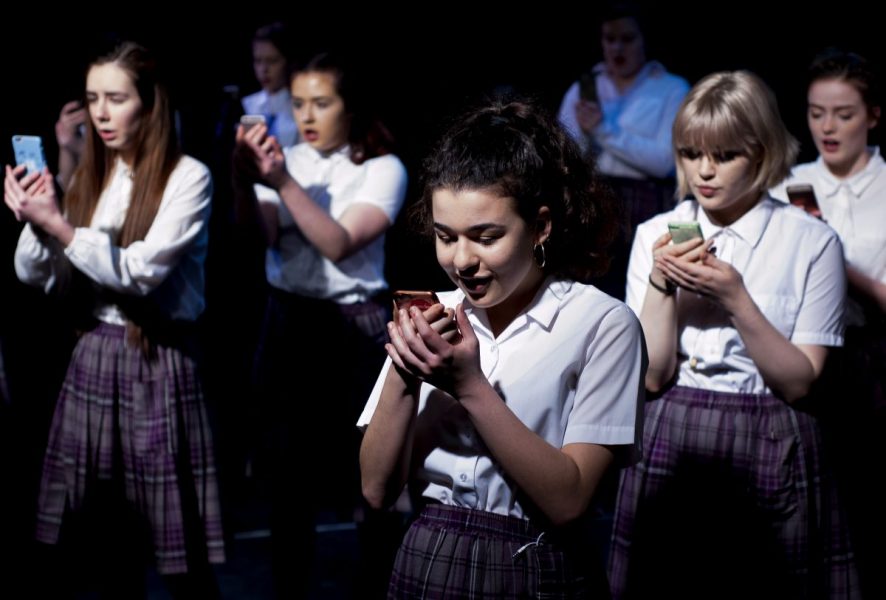The Lyceum Youth Theatre production of Evan Placey’s acclaimed play Girls Like That examines gender norms and expectations through showing the consequences for teenager Scarlett (Abinaya Rajendran) when a naked picture of her goes viral amongst her schoolmates. Its scenes depict modern day, technology-aided slut-shaming, contrasted with scenes of women in the past pushing against society’s expectations.
The dialogue is true to life and unflinching in showing the brutality with which young women talk about each other, and themselves. It begins with the cast of 20 young women playing with their phones, posing and repeating a chant of sexualised insults – slut, slapper, whore etc. It depicts the crowd mentality and insecurities of high school to devastasting effect, with each character chipping in to what could be one monologue. They speak as one. However, the talking head approach makes it challenging for the piece to engage for the full hour and a half.
The girls onstage tell us that girls like that, girls like Scarlett, ‘ruin it for everyone else.’ With girls like that, ‘you can just tell.’ The play contrasts the pitiless shaming that is inflicted on Scarlett with the admiring glances that are bestowed upon a male classmate when his photo is similarly leaked among the student population. While it shines a light on this double standard, in general the production ignores the behaviour and influence of boys in favour of focusing on the female characters’ bullying of Scarlett. It is rather telling that the only character in the play who initially does not want to look at the picture or engage in the shaming is male. It does seem to be letting the boys off rather easily, with no attention paid to the persistent coercion of females to send sexy pictures to boys, which is reportedly rife in schools, and surely a factor in the issue at the very least.
The production uses the physicality of its young actors to great effect, often playing with representations of a mob, as one girl is singled out by the others. The inspired choreography depicts the togetherness of girlhood, both good and bad, to fabulous effect – from swimming together and diving in the pool joyfully, to the embarrassing claustrophobic huddle of the pool changing room. The girls’ smart phones are put to use imaginatively as the main props – in the main scene where the picture is received by everyone in history class, when their phone torches are held aloft in place of candles at a night vigil – to underline the centrality of online communication in these girls’ lives.
The simplicity of the production is key, as it relies on the slick choreography and imagination of the group to recreate the spaces of girlhood – the playground, a party, McDonalds. The apparent simplicity is, however, deceptive. There is a lot going on here below the surface to create these scenes, which are a testament to the talent and hard work of everyone involved.
Scarlett’s confrontation with the group at the end attempts to bring the piece together by revealing that the women depicted in the scenes from the past – one where a woman tells her boyfriend she wants an abortion in the 1960s, another where a young girl stands up to workplace harassment – are females from her own family, researched for a school project. She declares that women, instead of men, have now become their own oppressors, by policing each other’s behaviour. This may be true but it isn’t the whole story. Yes, an internalised misogyny certainly exists, especially among female teenagers, but where are the boys in all this? Today’s young women didn’t invent double standards, and it seems particularly unfair for a male playwright to compare the worst behaviour of today’s girls with idealised versions of women in the past.
However, in showing the contradictions that young women must deal with, the expectations put upon them sexually and the sheer overwhelming grottiness of online slut-shaming, Girls Like That excels, as does the Lyceum Youth Theatre’s brilliant young cast.
